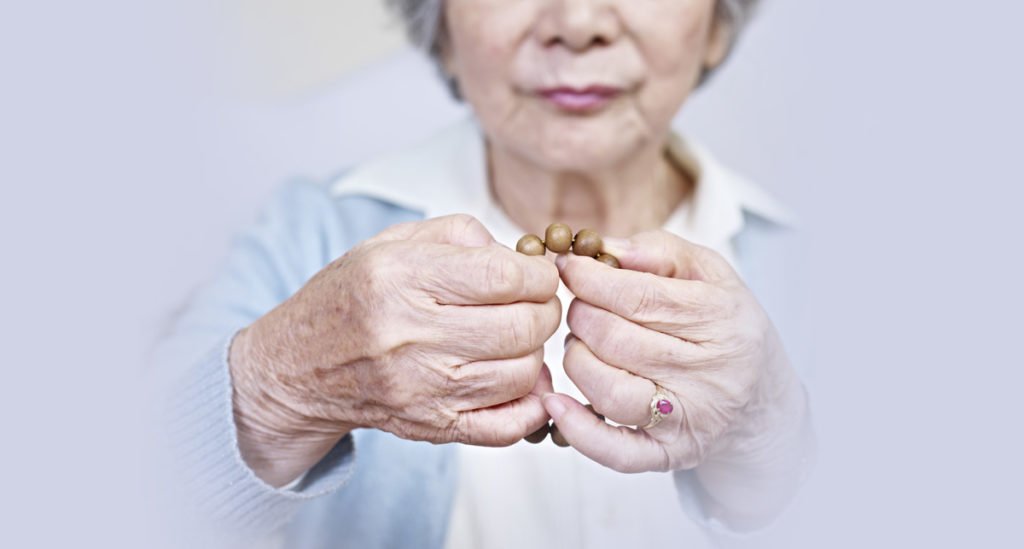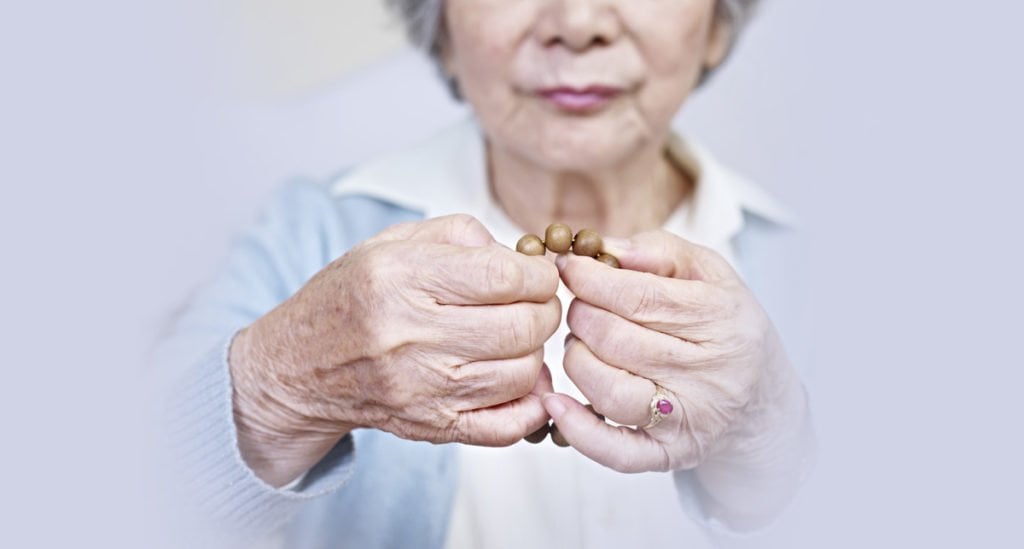
According to studies, spiritual life can enhance positive aging and health. A spiritual connection enhances the well-being of senior citizens — according to research — whether in the form of spirituality or formal religion [1]. This is aside from numerous studies citing the benefits of Buddhist meditation on health and cognition. [2] [See this feature with ten cited research studies indicating the meditational benefits to health.]
This fact is not a secret; it is well-known in the senior care community, especially senior living communities that promote practices of spirituality or faith. Although there’s no need to find a retirement community focused on your personal spirituality — especially if you have a strong belief system — it can certainly be reinforcing and engaging to live in a supportive environment. Today, there are retirement homes emphasizing Buddhist living and other spiritual paths, such as Catholic or other formal religious affiliations. [3]
28% of older adults live alone
Twenty-eight percent of older adults (in the United States) live alone according to the U.S. Department of Health and Human Services. This is linked to higher risks of high blood pressure, heart disease, obesity, weakened immune system, anxiety, depression, and cognitive decline according to this study. [7]
Considering the benefits of social activity to health and well-being, it can be beneficial for seniors to find a supportive retirement community [4] to help them enjoy a fulfilling life. For many, it can be even more beneficial to find a community with a spiritually fulfilling life, which generally includes spiritual programs, in addition to health and wellness experiences.
Social interaction opportunities are particularly important for seniors. The move to a retirement home can be a major change, and it often changes the social dynamic and frequency of interaction with family. Staying social not only decreases anxiety and stress, it reduces the incidence of health disorders, Alzheimer’s disease, and certain cancers. According to a feature in Harvard Health Publishing (Harvard Medical School):
“A strong social life has been linked with many health benefits, like less risk of depression and longer life span.” [5]
During stressful times, these relational connections may be especially soothing. Many senior citizens have to deal with a partner or loved one’s death. Others can struggle with their own disease or mortality. Belief will include a help structure to tackle these tough issues.
Here are the other benefits of how spirituality, or even formalized religion, can help seniors during difficult times.
1. Improve your social well-being
Religious or spiritual engagement in older adults is a perfect opportunity to learn and broaden social networks. Sangha, group or congregation spiritual activities, for example, helps attendees to interact, socialize, and support each other. These activities strengthen the supportive connections between the group — especially powerful if the activities include community service or giving. Engagement establishes intimate ties and provides a support network for individuals.
The social landscapes start changing as we age, as spouses, acquaintances, and other loved ones move on. Research indicates that sangha, spiritual and religious group social systems will battle depression from social isolation.
2. Excellent for your mental and emotional health
By buffering the impact of mental health problems[6], such as depression and anxiety, participation with faith groups may enhance mental and emotional stability. Research shows that spiritual engagement in life can build a sense of purpose that can help us deal with the pressures of aging. Individuals will look to faith as a method of encouragement to cope with physical sickness and depression by reducing their pressure through stress reduction. Sangha or congregation groups can also directly support their members in need or counseling or care.
3. Benefits to your physical well-being
Participating in group services[6] has been shown to reduce the incidence of illness triggered by stress. Of course, the group services, in the time of Covid-19 must be socially-distanced to protect vulnerable attendees. Alternately, supportive homes can provide opportunities for “live-streamed” spiritual events.
Evidence has shown that religious practices, such as daily meditation, contribute to lower obesity incidence, lower cholesterol, lower inflammation indicators, and lower medical risk outcomes, such as heart disease or failure.
Research has also shown that people who participate in group spiritual and religious events have risk for diabetes, heart attack, and stroke.
The reduced incidence of health conditions may be attributed to the focus on healthier behaviors and is also promoted by faith, optimism, and social interaction.
4. Helps Maintain And Improve Your Cognitive Function
By maintaining your mind active, religion can motivate behaviors that protect cognitive abilities. [6] For example, researchers in one study demonstrated that many of those who regularly attended religious events saw less reduced brain shrinkage as compared to those in the study who seldom attended.
There are also numerous studies on various practices such as mindfulness and reflection/meditation, mantra chanting, sutra recitation, homilies, scripture reading, service reciting/singing praises, and making friends with others. These activities engage cognitive activity and analytical reasoning and help retain mental abilities, which in turn will help to postpone cognitive deterioration. [See these studies cited in our feature on meditation benefits>>]
5. Improves Mood And Outlook
Several studies also correlate improved behavior of people who follow a formal spiritual or religious path their religious knowledge[8], along with more optimism, and confident outlook towards life and health. All of these are critical especially to seniors.
Even as seniors move into a residential home, they can feel lonely, which may have a detrimental effect on their moods. Many spiritually-oriented homes (or supportive communities) have organized transportation to various faith group services — which is proven in these studies to enhance self-esteem and optimism.
6. Sense Of Community
More formal spiritual or religious groups also cultivate fulfilling social networks amongst senior citizens, as demonstrated by surveys of religious support programs[8].
A research study released in the American Sociological Review found that 28 percent of citizens who attended an organized religious event every week were “highly happy” with their lives, as compared to the less than 20 percent amongst those who did not attend.
7. Longevity
Most studies reveal that spiritually-oriented adults live longer:
“People who attended religious services at least once a week were 46 percent less likely to die during the six-year study, says lead author Harold G. Koenig, M.D., of Duke University Medical Center in Durham, North Carolina. “When we controlled for such things as age, race, how sick they were and other health and social factors, there was still a 28 percent reduction in mortality,” he says.” [9]
Increased survival can be attributed to a variety of established causes that alleviate tension and thereby lead to healthy health: connecting to a group or society, and feeling the value is in your existence.
One hypothesis presumes that decreased cardiovascular mortality, likely due to religious behavior ‘s lifestyle or other cardioprotective impacts, improves longevity in good, religious individuals.
A spiritual or religious purpose — and participation — certainly demonstrates benefits in senior living on physical and mental wellbeing. Spirituality appears to be linked to slowing cognitive decline and helping people use strategies for coping with their illness and have a better standard of living.
NOTES
[1] Research cited from Drs Kaplan and Berkman, writing for Merck and Co.
[2] “Meditation could slow aging in your brain”, study says, CNN
[3] Buddhist Senior Care Organizations
[4] Faithbasedassistedliving.org is helpful for people looking for Catholic, Christian or Jewish assisting living environments.
[5] “Broader social interactions keeps older adults more active” Harvard Health Publishing
[6] “Psychology Benefits Society” Taking Faith in the Future!
[7] “Social isolation, loneliness in older people post health risks” National Institute on Aging
[8] “Benefits of Religion and Spirituality on Seniors” Chelsea Jewish Lifecare

